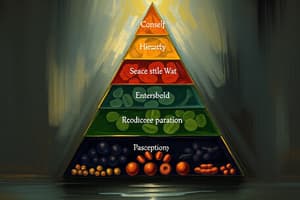Podcast
Questions and Answers
What is the primary focus of Maslow's approach to motivation?
What is the primary focus of Maslow's approach to motivation?
- Observable actions
- The whole person (correct)
- Individual parts of a person
- Single behaviors only
According to Maslow, what happens to a person's motivation when a need is satisfied?
According to Maslow, what happens to a person's motivation when a need is satisfied?
- It intensifies
- It becomes irrelevant
- It remains the same
- It diminishes and is replaced by another need (correct)
What differentiates Maslow's view of motivation from that of Gordon Allport?
What differentiates Maslow's view of motivation from that of Gordon Allport?
- Allport considers higher level needs
- Allport emphasizes the whole person
- Maslow focuses on singular needs only
- Maslow prioritizes unconscious motives (correct)
Which of the following is NOT true about people's basic needs according to Maslow?
Which of the following is NOT true about people's basic needs according to Maslow?
How did Maslow conceptualize the arrangement of needs?
How did Maslow conceptualize the arrangement of needs?
What does Maslow mean by saying that motivation is often complex?
What does Maslow mean by saying that motivation is often complex?
What represents a key assumption in Maslow's theory about human motivation?
What represents a key assumption in Maslow's theory about human motivation?
Which aspect of human motivation does Maslow believe is often unconscious?
Which aspect of human motivation does Maslow believe is often unconscious?
Flashcards
Maslow's Holistic Approach to Motivation
Maslow's Holistic Approach to Motivation
The whole person, not just a part, is motivated.
Complex Motivation
Complex Motivation
Human behavior is often driven by more than one motive.
Unconscious Motivation
Unconscious Motivation
Motivations can be hidden from the person themselves.
Hierarchy of Needs
Hierarchy of Needs
Signup and view all the flashcards
Hierarchy of Needs: Lower Level Needs
Hierarchy of Needs: Lower Level Needs
Signup and view all the flashcards
Hierarchy of Needs: Higher Level Needs
Hierarchy of Needs: Higher Level Needs
Signup and view all the flashcards
Universal Needs
Universal Needs
Signup and view all the flashcards
Motivational Power of Needs
Motivational Power of Needs
Signup and view all the flashcards
Study Notes
Maslow's Theory of Personality
- Maslow's theory of personality adopts a holistic approach to motivation, focusing on the entire person rather than individual parts.
- Motivation is often complex, arising from multiple interconnected motives. A single action (e.g., seeking sexual union) can be driven by various needs beyond immediate physical ones (e.g., dominance, companionship).
- Motivation can be unconscious, underlying apparent motives. (e.g., a student's drive for good grades could mask a need for power).
- People are constantly motivated by needs. When a need is satisfied, it's replaced by another.
- Basic needs are universal. Cultures may differ in how those needs are met, but the underlying needs (food, safety, friendship) are common.
- Needs are hierarchically arranged. Lower-level needs must be met before higher-level needs become motivational drivers.
Hierarchy of Needs
- The hierarchy of needs is a concept, not a strict pyramid as is commonly depicted.
- Lower-level needs (e.g., physiological, safety) take precedence over higher-level ones (belonging, esteem).
- Conative needs (e.g., hunger, safety) drive behavior. These "basic needs" are arranged hierarchically, with lower-level needs prioritized.
- Needs have prepotency. Lower-level needs (e.g., safety, physiological) must be reasonably met before higher-level needs (esteem, self-actualization) become influential motivators.
Studying That Suits You
Use AI to generate personalized quizzes and flashcards to suit your learning preferences.




